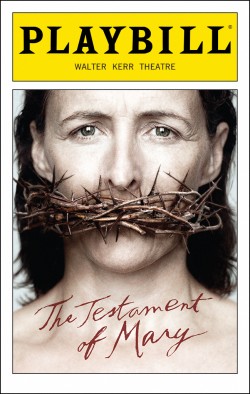The Controversial 2013 Broadway Show by Colm TóibÃn, The Testament of Mary
This was the official website for the controversial 2013 Broadway show by Colm Tóibín, The Testament of Mary, starring Fiona Shaw.
Content is from the site's 2013 archived pages as well as from other outside press and review sources.

About the show
The historic collaboration between actress Fiona Shaw and director Deborah Warner results in the creation, for the first time, of a new work for Broadway, written by acclaimed author Colm Tóibín. The New York Times calls The Testament of Mary “beautiful and daring.” The New York Review of Books calls it “subversive and ruthless,” and lauds it for its “sensational theatricality.” And Entertainment Weekly says it is “spellbinding and emotional. A generous leap of imagination.”
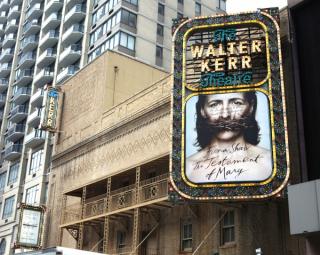
Running Time
90 minutes, with no intermission
"The Testament of Mary"'s Fiona Shaw, Deborah Warner & Colm Toibin on Daring To Tell This Epic Story
Company

Deborah Warner and Fiona Shaw
This year marks the 25-year anniversary of the working partnership between Fiona Shaw and Deborah Warner. They first worked together on a landmark production of Electra at the Royal Shakespeare Company in 1988 (Olivier and London Critics' Awards, Best Actress). Further productions together have included The Good Person of Sichuan (National Theatre; Olivier and London Critics' Awards, Best Actress), Hedda Gabler (Abbey Theatre, Dublin and West End; London Critics' Award, Best Actress, Laurence Olivier Award for Direction and Production), Footfalls (Garrick Theatre, West End), Richard II (NT, Paris, Salzburg; French Critics Best Foreign Production), The Waste Land (Brussels, Dublin, Paris, Toronto, Montreal, Cork, London, Adelaide, Perth, Dublin, Bergen, Madrid and New York; two Drama Desk Awards, Best Director Obie Award); Medea (Abbey Theatre, Dublin, West End, BAM, Paris and Broadway; Evening Standard Award for Best Actress and Best Director; Tony Award nominations for Best Actress and Best Director and two Obie Awards), The Powerbook (NT), Readings (Paris; a poetry show), Julius Caesar (Barbican, Paris, Madrid and Luxembourg), Happy Days (NT, Epidaurus, where it made history as the first 20th century text to be performed in the ancient theatre, Amsterdam, Paris, Dublin, BAM), Dido and Aeneas (Vienna, Opera Comique - Paris, Amsterdam), Tony Kushner's translation of Mother Courage and Her Children (NT) and Peace Camp for the London 2012 Cultural Olympics.
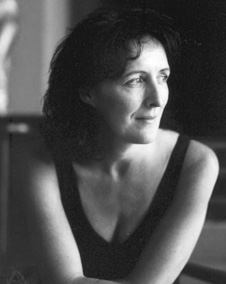
Fiona Shaw
Other theatre includes Julia in The Rivals (National Theatre); Tatiana in Philistines, Celia in As You Like It, Mme. de Volanges in Les Liaisons Dangereuses, Mephisto, Hyde Park, Beatrice in Much Ado About Nothing, Portia in The Merchant of Venice, Katherine in The Taming of the Shrew, New Inn (Royal Shakespeare Company); title role in Mary Stuart (Greenwich Theatre); Machinal (NT, Best Actress, Evening Standard and Olivier Awards); Millamant in The Way of the World (NT); title role in The Prime of Miss Jean Brodie (NT); Rosaline in Love's Labour's Lost (Bolton Octagon); Mary Shelley in Bloody Poetry (Foco Novo); Rosalind in As You Like It (Old Vic Theatre, Olivier Award for Best Actress); The Seagull directed by Peter Stein (Edinburgh Festival); Robert Wilson's The Days Before: Death, Destruction and Detroit III and My Life as a Fairy Tale (both at Lincoln Center); Woman and Scarecrow (Royal Court Theatre); Lady Gay Spanker in London Assurance (NT); Mrs. Gunhild in John Gabriel Borkman (Abbey Theatre, Dublin and BAM); Galatica in Scenes from an Execution (NT); The Rime of the Ancient Mariner directed by Phyllida Lloyd (Old Vic Tunnels). Films include My Left Foot, The Mountains of the Moon, Three Men and a Little Lady, London Kills Me, Super Mario Brothers, Undercover Blues, Jane Eyre, Anna Karenina, The Butcher Boy, The Avengers, The Last September, the Harry Potter film series, The Triumph of Love, The Black Dahlia, Catch and Release, Fracture, The Tree of Life. Television includes “Fireworks for Elspeth,” “Persuasion,” “Gormenghast” (BBC), “Mind Games,” “Miss Marple,” “True Blood” (HBO). As a director she has staged productions for the ENO (The Marriage of Figaro, Riders to the Sea), the National Theatre (Widowers' Houses), Abbey Theatre (Hamlet) and Young Vic (Elegy for Young Lovers). Ms. Shaw is an Officier des Artes et des Lettres. She was awarded an honorary Commander of the Order of the British Empire (CBE) in the 2001 New Year's Honours.
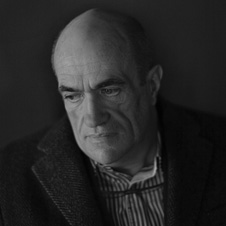
Colm Tóibín (Author)
His work has been translated into more than 30 languages. His novels include The Master, winner of the Los Angeles Times Novel of the Year; Brooklyn, winner of the Costa Novel of the Year; and The Blackwater Lightship, which was filmed starring Angela Lansbury. His collections of stories are Mothers and Sons and The Empty Family and his non-fiction works include Homage to Barcelona and The Sign of the Cross: Travels in Catholic Europe. In 1995 he was awarded the E.M. Forster Prize from the American Academy of Arts and Letters and in 2010 the Irish PEN Award for Literature. He has been twice short-listed for the Booker Prize. His play, Beauty in a Broken Place, was commissioned by the Abbey Theatre, Ireland's national theatre, to mark its centenary. His journalism and essays have appeared in The New Yorker, Vogue, Vanity Fair and The New York Review of Books. He is a contributing editor at The London Review of Books and a member of the Royal Society of Literature. He has taught at Stanford and Princeton universities and at the University of Texas at Austin. He is currently the Irene and Sidney B. Silverman Professor of Humanities at Columbia University.
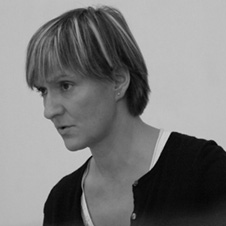
Deborah Warner (Director)
Her career spans theatre and opera as well as forays into television and film. She founded her own theatre company - The Kick Theatre Company when she was 21 - directing The Tempest, Measure for Measure, King Lear and Coriolanus. Her other theatre credits include Titus Andronicus (Royal Shakespeare Company, Laurence Olivier and Evening Standard Awards for Best Director); King John (RSC); King Lear (National Theatre); Coriolanus with Bruno Ganz (Salzburg Festival); Une Maison de Poupee with Isabelle Huppert (Odéon, Paris); School for Scandal (Barbican); and three devised installation pieces: The St. Pancras Project, The Tower Project (LIFT) and The Angel Project, which was seen at the Lincoln Center Festival. Her opera credits include Wozzeck, La Voix Humaine (Opera North); The Rape of Lucrece (Munich); Don Giovanni and Fidelio (Glyndebourne); The Turn of the Screw (Royal Opera House; Evening Standard and South Bank Show Awards); The St. John Passion, Death in Venice, The Diary of One Who Vanished (ENO); La Traviata (Vienna Festival); and the ENO production of Eugene Onegin, which she will stage later this year in NYC, marking her debut at the Met. Ms. Warner's film and TV credits include The Waste Land (Un Certain Regard, Cannes Film Festival); The Last September with Fiona Shaw, Maggie Smith and Michael Gambon (official selection, Director's Fortnight, Cannes, Toronto and Edinburgh film festivals); and “Hedda Gabler,” “Richard II” and “The St. John Passion” for the BBC. She was named Chevalier de l'Ordre des Arts et des Lettres by the French government in 1992 and Officier in 2000 and was made Commander of the British Empire (CBE) in the Queen's Birthday Honours list in 2006.

Tom Pye (Set Designer)
Broadway: All My Sons (John Lithgow and Dianne Wiest), Top Girls (Manhattan Theatre Club), Cyrano de Bergerac (Kevin Kline), The Glass Menagerie (Jessica Lange), Fiddler on the Roof (Tony Award nomination), Medea starring Fiona Shaw/directed by Deborah Warner (also Dublin, Paris, West End. Other recent credits: NSFW, Fewer Emergencies (Royal Court Theatre/London); Miss Fortune (opera for Bregenz Festival and Royal Opera House/Covent Garden); Eugene Onegin (co-produced by ENO/Metropolitan Opera); Cunning LIttle Vixen (Glyndebourne); John Gabriel Borkman (Abbey Theatre/BAM - nominated for Best Design/Irish Times Award); Sinatra (West End). Other ENO credits include Elegy for Young Lovers, Messiah, Riders to the Sea, Orfeo, Death in Venice (also La Scala, winning Premio Franco Abbiati della Critica Musicale Italiana), Death of Klinghoffer (co-produced w/ Metropolitan Opera). National Theatre (London): Mother Courage, Major Barbara and Measure for Measure (also world tour w/Complicite). Lyon Opera: Cosí fan tutte, Les Noces de Figaro and Don Giovanni. With Deborah Warner: Happy Days (National Theatre, BAM, world tour), Julius Caesar (Barbican, Paris, Madrid), Powerbook (London, Paris, Rome), The Angel Project (London, Australia, New York). Film and television include A Feast at Midnight, Christy Malry's Double-Entry, the Emmy Award-winning film “Gloriana,” “Richard II” (Art Direction), “Just William” and “Late Michael Clark” on BBC.
Ann Roth (Costume Designer)
Select theatre: The Best Man; Hurlyburly; The Best Little Whorehouse in Texas; Singin' in the Rain; The House of Blue Leaves (Tony nomination); Waiting for Godot; The Odd Couple; plus The Crucifer of Blood, The Royal Family, Present Laughter, Death of a Salesman, The Book of Mormon (Tony nominations). Select films: Extremely Loud & Incredibly Close, Midnight Cowboy, The Day of the Locust (BAFTA), Hair, Working Girl, Sabrina, The Unbearable Lightness of Being, The Birdcage, The English Patient (Oscar), The Talented Mr. Ripley, Cold Mountain, “Angels in America,” The Stepford Wives, The Village, Closer. Recipient, the Irene Sharaff Lifetime Acheivement Award (2000).

Jennifer Tipton (Lighting Designer)
is well-known for her work in theatre, dance and opera. Her recent work in opera includes L'Elisir d'Amore directed by Bartlett Sher at the Metropolitan Opera, Elektra for the Chicago Lyric Opera and Maria Stuarda at the Metropolitan, both directed by David McVicar. Her recent work in dance includes Alexei Ratmansky's Romeo and Juliet for the National Ballet of Canada and Paul Taylor's Gossamer Gallants. In theatre her recent work includes James Joyce's The Dead at the Court Theatre in Chicago and Richard Nelson's Sorry at the New York. Ms. Tipton teaches lighting at the Yale School of Drama. She received the Dorothy and Lillian Gish Prize in 2003 and in April 2004, the Mayor's Award for Arts and Culture in New York City. In 2008 she was made a United States Artists “Gracie” Fellow and a MacArthur Fellow.

Mel Mercier (Composer/Sound Designer)
Composer, performer, academic and teacher. Mel is head of the School of Music and Theatre, University College Cork, where he teaches Irish, African, Indian and Indonesian musics. Recent projects: original music for Fiona Shaw/Phyllida Lloyd's The Rime of the Ancient Mariner (Epidaurus, Greece/Old Vic Tunnels, London); soundscape for Peace Camp, a coastal installation created by Deborah Warner in collaboration with Fiona Shaw (London 2012 Festival); and performances of John Cage's Roaratorio: An Irish Circus on Finnegans Wake (Cologne/Amsterdam - Cage Centenary). Mel has performed and recorded with pianist and composer Mícheál Ó Súilleabháin and with many other leading Irish traditional musicians for more than 30 years. Throughout the 1980s he performed in Europe and the U.S. with John Cage and the Merce Cunningham Dance Company (Roaratorio, Inlets, Duets). Recent composition in theatre includes Sétanta (Irish Times Theatre Award nom. - Fibín/Abbey Theatre); Happy Days (NT/European tour/Washington DC and BAM, New York); Julius Caesar (Barbican/Paris/Madrid/Luxembourg); Fewer Emergencies (Royal Court Theatre); Medea (Drama Desk nom. - Abbey/West End/Broadway/Paris).
Editor's note: "I had just returned from a 2 week vacation in Hawaii when I received an invitation to attend this show with my publisher. We had been celbrating the success of my sister's internet business which had been losing money relying on traditional advertising, but suddenly took off after refocusing their effort on search. They partnered with a highly recommended SEO service - TNG/Earthling, led by Bob Sakayama who was able to get their Google ranks high enough to trigger sales. So we were celebrating her newly acquired high ranks in Google. I had been relaxing and recharging at a fabulous luxury rental on Maui so by the time I arrived in NYC I was completely unprepared for this experience. You have to understand the island life to understand the shock of just being back in the Big Apple, which is something all by itself when you've gotten used to island time on Maui. But I really enjoyed this show, probably because I tend to appreciate the provocative. It may offend some Christians, who do not appreciate any questioning of their beliefs, but this is a work that has been very carefully written and staged to maximize its impact while not imposing any political propaganda on the audience. Go see it with an open mind and keep in mind that our culture is rooted in the Christian myth which amplifies the significance of the truths it exposes." Gloria Dynes
PRESS / REVIEWS
The Testament of Mary - Brief Highlights
 |
Colm Tóibín's The Testament of Mary, Starring Fiona Shaw as Biblical Icon, Closes on Broadway May 5
Adam Hetrick - May 05, 2013
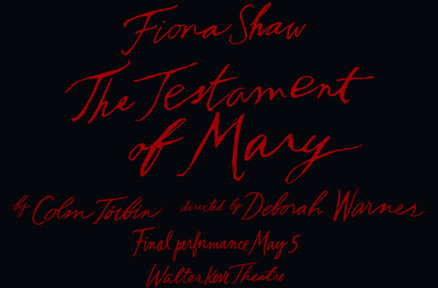
The Testament of Mary, starring Tony Award nominee and four-time Olivier Award-winning actress Fiona Shaw as the mother of Christ, ends its Broadway run May 5 at the Walter Kerr Theatre after 16 regular performances.
Authored by Irish novelist Colm Tóibín, the play began previews March 26 and officially opened to mixed reviews April 22 after playing 27 previews. It was scheduled to play a 12-week engagement through June 16.
Despite earning three Tony nominations, including Best Play, The Testament of Mary ends its run prematurely. Acclaimed actress Shaw did not receive a Tony nomination for her performance in the solo play as the forlorn mother who questions the death of her son in the days following his crucifixion.
The Testament of Mary also earned Tony Award nominations for Best Lighting (Jennifer Tipton) and Best Sound (Mel Mercier).
The production marked the first collaboration between Shaw and Warner to premiere in the U.S. The two have earned acclaim for their work on Medea, Happy Days, Mother Courage, Hedda Galber, The Good Person of Sichuan and The Waste Land. The stage production is based on Tóibín's 96-page novel, which imagines a new account of Christ, one in which his mother questions her son's death, his divinity and the followers who called him the son of God. It was released in 2012.
Shaw spoke about the play in a recent feature with Playbill. "Mary is an icon, and a symbol," who "has probably been filtered in our lives through Renaissance paintings and childhood religion. She's a very distant figure. But this novel maps out a landscape in which this woman has to cope with her son's self-destruction," to try to understand the reasons for his death, "which is agony for her," she said.
"Theatre is an imaginative frame, so the play takes place now," she continued. "The story is in many people's minds now — 2,000 years after the events, the story continues. And like all stories, it has embellishments — different colors, different aspects. So it is going on now. I went last week to see the Piero Della Francesa exhibit at the Frick Collection. In the 15th century, they painted the Virgin as a 15th-century woman. So in this play, you meet her as a 21st-century mother. But the events refer to a time when the Romans did crucify their dissidents."
As previously reported by Playbill.com, the first preview and opening night of the controversial play were met with protests from a Catholic group.
The producers are Scott Rudin (The Book of Mormon, "The Social Network"), Stuart Thompson, Jon B. Platt, Roger Berlind, Broadway Across America, Scott M. Delman, Jean Doumanian, Roy Furman, Stephanie P. McClelland, Sonia Friedman Productions/Robert G. Bartner, The Araca Group, Heni Koenigsberg, Daryl Roth and Eli Bush.
The production has set design by Tom Pye, costume design by Ann Roth, lighting design by Jennifer Tipton and original music and sound design by Mel Mercier.
According to producers, "In The Testament of Mary the mother of Jesus tells her story of her son’s Crucifixion."
Garry Hynes staged a 2011 premiere of the work starring Marie Mullen at the Dublin Theater Festival. That project, billed Testament, gave life to the novel.
 |
The Testament of Mary Receives Tony Award® Nominations
The Tony Awards - April 30, 2013
The Testament of Mary was nominated for a Tony Award® for Best Play. Jennifer Tipton was nominated for Best Sound Design of a Play, and Mel Mercier for Best Lighting Design of a Play. The annual awards ceremony for the Tony Awards® will be held on Sunday, June 9, 2013.
 |
Review: Fiona Shaw Fleshes Out The Testament of Mary
Charles McNulty - April 22, 2013
“The Testament of Mary belongs to Shaw, one of the most versatile and commanding stage actresses in the English-speaking world.”
NEW YORK — Sucking on a cigarette and swigging from a bottle of spirits, the Virgin Mary isn't looking all that virginal in Colm Tóibín's defiantly strange, inescapably controversial and at moments intensely gripping dramatic experiment "The Testament of Mary."
If she seems distinctly Irish that is because the play, which had its Broadway opening Monday at the Walter Kerr Theatre, is being performed by the powerhouse Irish actress Fiona Shaw, known to many as Harry Potter's aunt but awarded an honorary Commander of the Order of the British Empire for her stage genius.
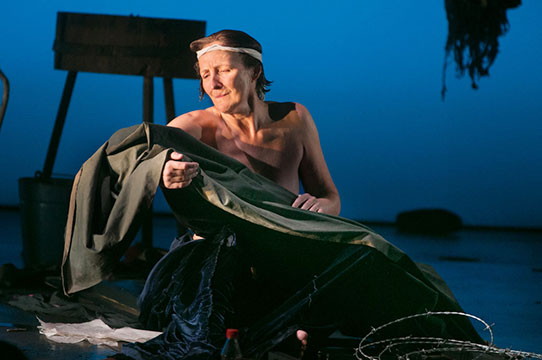
Her fierce virtuosity transforms Tóibín's extended monologue into a full-blooded theatrical portrait. Alone onstage, she relives her famous son's story not as it has been officially passed down by the Gospel writers but as she experienced it with a mother's grieving heart.
Delivering her version of events in the shadows of those standing guard of New Testament orthodoxy, this solitary and subversive Mary combines the sorrowful bitterness of Medea with the brooding frustration of Hedda Gabler and the indomitable chattiness of Winnie from Beckett's "Happy Days" — three characters Shaw has put her inimitable stamp on.
But the incantatory power of her acting recalls even more another of her grand achievements in the theater with director Deborah Warner, her rendition of T.S. Eliot's "The Waste Land," a project in which Shaw channeled voices and issued forth presences like a medium at a turbo-charged séance.
Warner's production, directed with the meticulous scenic care of an art installation, first presents Mary as she has been traditionally presented — as a symbol of maternal love and purity. Before the play begins, audience members are invited to come up on the stage and view the artifacts, which include Shaw herself, head draped and holding flowers, on display as Mary in a glass box.
The term "icon" has lost much of its meaning, but the original Madonna has a claim on the word that supersedes even that of the pop star who impertinently borrowed her name. The Renaissance masters have given us countless images of Jesus' mother, but their depictions are voiceless. She is an object, not a subject.
In "The Testament of Mary" she does something that is almost unimaginable — she speaks. And the words Tóibín gives her are not at all what we might expect. They are highly opinionated, often exasperated and anything but meek and mild.
She refers to the retinue Jesus has acquired as a "group of misfits." She says that whenever she has seen more than two men together she has seen "foolishness" and "cruelty." And she speaks disdainfully of all "the high-flown talk" of miracles that has the authorities anxiously tracking her son's every move.
This Mary scorns religious zeal. "Something about the earnestness of those young men repelled me, the sense that there was something missing in each one of them," she says of her son's followers who flocked to her home to sit at his feet. And the way Jesus talked to these visitors, "his voice all false, and his tone all stilted," bothered her in no small part because it excluded her.
The guiding perspective here is female-centered rather than feminist. Mary trusts her senses more than she trusts the ideologies of men. But for all her independence, she is first and foremost a mother recounting her futile and self-professedly unheroic attempts to save her son's life.
There's something inherently dangerous in creating a drama around the Blessed Virgin Mary, as she is known by the Catholic faithful. Yet the tone is too compassionate for blasphemous intentions.
Tóibín's play, which exists in an extended form as a novel, is part of a tradition of religious art that wants to examine biblical stories from a more realistic perspective. Caravaggio's "The Death of the Virgin," with its stark depiction of Mary's bodily remains and its prioritizing of the seen world over the unseen world, would seem to have provided the playwright with a daring model.
But just as Caravaggio includes a faint halo in his painting, Tóibín leaves enough ambiguity for miraculous possibilities. The rising of Lazarus, harrowingly recounted by Mary, may not have happened exactly as recorded, but something occurred that challenged the natural order in a way that is far more frightening than a believer would care to acknowledge. (Lazarus' post-resurrection wailing and difficulty in swallowing tell a chilling tale.)
As for the conception story, Shaw's Mary injects a note of sly sarcasm as she recalls the official doctrine being explained to her. "I barely listened," she says. "I knew what happened."
Tóibín's writing is elegant, rhythmic and vivid, but it's prose by a fiction writer and essayist whose primary medium is the page. His text, though it started as a play, is more impressive as a novel. In its dramatic format, there's an occasional choppiness to the transitions and the ending is abrupt.
Warner is an ideal collaborator for Tóibín because she's able to set the beauty of his language theatrically aloft in a production that makes the minimalist most of its resources on Tom Pye's dreamscape set, in which a ladder and the memory of an "indignant bird" feeding on the bodies of hares are all that's needed to invoke the crucifixion.
Jennifer Tipton's painterly lighting, Ann Roth's spare costume design (inspiring Shaw to become another character with the simple addition of fabric draped over a shoulder) and Mel Mercier's original music and sound design establishing the eerie atmosphere of a religious thriller all help to create stunning tableau effects.
But "The Testament of Mary" belongs to Shaw, one of the most versatile and commanding stage actresses in the English-speaking world. Her voice infuses Tóibín's writing with living color and her emotion forcefully clarifies the point of this risky and very un-Broadway-like theatrical endeavor — to find grace and redemption in the honesty of flesh and blood.
 |
Review: A Testament to Greatness
Elisabeth Vincentelli - April 22, 2013
“Few, if any, others could match Shaw's ferocious intensity, keen intelligence and dark humor.”
 |
Review: Fiona Shaw Shines in Audacious Drama
Linda Winer - April 22, 2013
“With both enormous audacity and bottomless grief, the peril comes in missing The Testament of Mary.”
 |
Review: The Testament of Mary: Full of Grace and Compassion
Elysa Gardner - April 22, 2013
“Shaw gives full force to Tóibín's imagining of a woman driven as much by her desire for justice and sympathy for others as by grief or fury.”
 |
Review: Virgin Mary Takes On Vultures Human, Feathered
Jeremy Gerard - April 22, 2013
“So electrifying is Fiona Shaw that the performance left me, along with the rest of the audience, struck silent.”
 |
Review: The Testament of Mary
Jesse Green - April 22, 2013
“Subtly and thrillingly done.”
 |
Review: The Testament of Mary
Joe Dziemianowicz - April 22, 2013
“Fiona Shaw ignites and glows with a fevered intensity.”
 |
Review: The Testament of Mary
ROBERT FELDBERG - April 22, 2013
“Fiona Shaw is electric.”
 |
Review: The Testament of Mary
Marilyn Stasio - April 22, 2013
“Fiona Shaw makes an icon human in a powerhouse Broadway performance.”
 |
Review: The Testament of Mary
David Cote - April 22, 2013
“Shaw's performance is keen and staggering.”
Last time she was on Broadway, Fiona Shaw made a bloody sacrifice of her children in Medea. Now the grand, incisive performer is back as a different sort of mother with a different sort of sacrifice. She’s the Virgin Mary, railing against the mythologizing of her dead son, Jesus. Not that Mary identifies him explicitly. “Something will break in me if I say his name,” she tells us. The Testament of Mary is the biblical icon’s remembrance of her son’s apostles (“misfits,” she calls them), his miraculous acts and his brutal execution. The setting is many years after the Crucifixion, as Christ’s early converts busily compile the Gospels that will spread a new religion. But Mary doesn’t care about dogma or Immaculate Conception; she just wants her child back.
Far from a sentimental treatment of the mother-son bond barely explored in the Bible—but exhaustively cataloged in European art for centuries—Testament is a brief but rigorous application of humanist skepticism to the notion of Christ’s divinity. In this monologue, author Colm Tóibín doesn’t set out to prove or disprove whether Mary gave birth to the Son of God, but he gently allows room for both wonder and doubt. Yes, Mary recounts, in a harrowing passage, the raising of Lazarus—but she wasn’t there. When she does meet him, she says Lazarus is more zombie than man. Likewise, the text emphasizes Jesus’ pain and fear of death. Scour Scripture and the apocrypha; you won’t find any description of a frantic Christ trying to stop the Romans from nailing the second hand.
Shaw’s performance is keen and staggering in its total effect, and slightly self-indulgent in its particulars (I felt a similar dichotomy a decade ago with her Medea). She has a tendency, especially early in the show, to show you how. bloody. hard. she’s acting! And director Deborah Warner allows too much neurotic prop-moving business and italicized bits of mugging. (It’s probably intentional, as the character is still processing the trauma and avoiding the admission of her fundamental lack of faith.) Still, this is a potent piece of writing, and Shaw winds up to a shattering finale. “Who is my mother?” Christ asks, philosophically yet woundingly, in the Book of Mark. Foolish boy; the answer is right here.
 |
Review: The Testament of Mary
David Rooney - April 22, 2013
“A work of stunning directness, the austerity of its prose matched by its soul-piercing empathy.”
 |
Review: There's Something (Weird) About Mary
The Associated Press - April 22, 2013
The one-woman show, The Testament of Mary, opened Monday at the Walter Kerr Theatre starring Fiona Shaw and taking big bites out of the New Testament.
 |
The Testament of Mary Receives Drama League Nominations
Drama League - April 21, 2013
The Testament of Mary was nominated by the Drama League for Outstanding Production of a Broadway or Off-Broadway Play. Fiona Shaw was nominated for the Distinguished Performance Award. The annual awards ceremony will be held on Friday, May 17, 2013.
 |
Fiona Shaw Receives Outer Critics Circle Nomination
Outer Critics Circle - April 21, 2013
Fiona Shaw was nominated by the Outer Critics Circle for Outstanding Solo Performance in The Testament of Mary. The annual awards ceremony will be held on Thursday, May 23rd.
 |
Mother Superior
Barbara Hoffman - April 20, 2013
Her roles have stretched this Brit actress to her physical limits and now she faces her toughest yet - as the Virgin Mary.
 |
Fiona Shaw and The Testament of Mary
Kurt Anderson - April 19, 2013
The Testament of Mary, which Colm Tóibín based on his own novel, presents not the saintly exemplar of maternal love familiar from religious paintings, but a woman of flesh and blood (and attitude).
 |
A Modern Mary
Stefanie Cohen - April 18, 2013
Every evening, Fiona Shaw takes a nap, runs through her lines and then steps out on stage to play a mom. Who happens to have given birth to Jesus.
 |
Fiona Shaw on Playing the Mother of God in The Testament of Mary
Boris Kachka - April 7, 2013
New York Magazine spent a day with Fiona Shaw to talk about her highly praised—and often highly controversial—career as a stage and film actress and her current work, The Testament of Mary, on Broadway.
 |
Our Lady of the Fragile Humanity
Colm Tóibín - April 4, 2013
Colm Tóibín recounts his experiences with faith and Mary in his lifetime that led to The Testament of Mary: “We could imagine what it might have been like in a time of turmoil for a woman to go through immense suffering, a woman who was human and mortal before she became the exalted figure to whom we prayed.”
 |
Who was Mary?
Martha Teichner - March 31, 2013
“Anyone who looks at the story of Christianity, of the origins of it, of the crucifixion itself, must wonder”even on the best days, even on Easter Sunday—if there's any other way to look at it.” Colm Tóibín contributes to CBS Sunday Morning's feature on Mary, the most iconic woman of the New Testament.
 |
The Testament Of Mary: A Familiar Mother, In First Person
NPR Radio: All Things Considered - March 29, 2013
How do you play a character who's been depicted more than nearly any other character in all of Western civilization? That's the challenge currently facing Irish actress Fiona Shaw in ...
 |
Catholic Group Unhappy with Colm Tóibín's Mary Play on Broadway
David Ng - March 27, 2013
A Catholic group is speaking out against a new Broadway play by Irish novelist Colm Tóibín that offers an alternative interpretation of the life of the Virgin Mary.
Blasphemy on Broadway: Catholics Protest "The Testament of Mary" by Colm Toibin
 |
The Testament of Mary Sparks a Mere Flicker of Protest
Patrick Pacheco - March 27, 2013
About 50 people gathered outside the Walter Kerr Theatre on Tuesday evening to decry the first previews of the new Colm Tóibín play, The Testament of Mary.
 |
On First Preview Night, Protesters Rally Outside Broadway's The Testament of Mary
David Gordon - March 27, 2013
Religious group gathered outside the Walter Kerr Theatre to denounce “the blasphemous play.”
 |
Student Rush Ticket Policy Announced
Adam Hetrick - March 27, 2013
Producers of the Broadway premiere of The Testament of Mary, starring Olivier Award winner and Tony® nominee Fiona Shaw as the mother of Jesus, have announced a limited student rush ticket policy for the new solo drama by Colm Tóibín.
